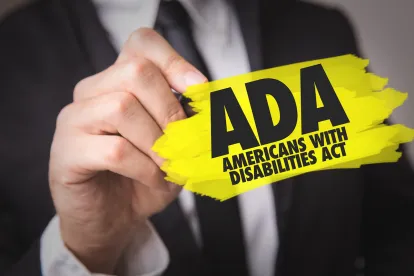While many traditional places of public accommodation, such as theaters, stadiums, restaurants, amusement parks, and retail stores, have shut down their operations in response to “shelter in place” and “social distancing” orders issued to prevent the spread of COVID-19, many businesses deemed “essential” by government orders or otherwise continuing operations have adopted sound safety rules designed to keep their employees safe.
For the most part, these safety rules are both recommended and lawful, but they are subject to obligations under Title III of the Americans with Disabilities Act (ADA) (42 U.S.C. § 12182(b)(2)(A)(ii) & (iii)) to provide “reasonable modifications” of policies, practices and procedures, or “auxiliary aids and services,” where necessary to provide equal access to persons with disabilities against the regulatory right to implement neutral policies where it would be a “direct threat” to health or safety to modify the practice. In other words, neutral rules must still be weighed against these ADA obligations.
Below are answers to some frequently asked questions (FAQs) that businesses have been asking.
FAQs for Businesses’ Treatment of Customers During COVID-19 Pandemic
Question 1: What laws govern how a business treats its customer during the pandemic?
Answer 1: In addition to any federal, state, or local orders, such as the many “shelter in place” or lockdown orders, businesses should be mindful of their obligations under the ADA and Title II of the Civil Rights Act of 1964, which prohibit discrimination in places of public accommodation, and analogous state and local laws that prohibit discrimination based on gender, religion, ethnicity, sexual orientation, disability, or other protected statuses by private businesses open to the public.
Q2: Can a business screen customers for symptoms of COVID-19 and exclude those with such symptoms?
A2: Unfortunately, because there is no precedent for this situation or anything like it, the answer is far from clear. For the reasons explained briefly below, we think that screening for COVID-19 symptoms, or excluding those with such symptoms, is potentially problematic and could expose a business to a claim of discrimination. Section 202(b)(2)(A)(i) (42 U.S.C. § 12182(b)(2)(A)(i)) of the ADA precludes a place of public accommodation from using “eligibility criteria” to determine entry to that place, or participation in its services or activities, unless the public accommodation can establish that it is “necessary” to the conduct of the services or activities of that business. In addition, under Section 208 the ADA regulations (28 C.F.R. § 36.208), a public accommodation can take actions that would otherwise be discriminatory if there is a “direct threat” to the health or safety of others.
One may initially think that the various declarations of emergencies by various government bodies and the Centers for Disease Control and Prevention (CDC) would be sufficient to declare it “necessary” to protect employees and other customers, or, alternatively, that permitting someone with COVID-19 symptoms to enter and participate in a business’s services and activities would present a “direct threat” to others sufficient to warrant protective action. In fact, the Equal Employment Opportunity Commission (EEOC), which has no jurisdiction over the relationships between businesses and their customers, has declared COVID-19 to be a “direct threat” under Section 1630.15(b)(2) (29 C.F.R. § 1630.15(b)(2)), a nearly identical provision in the regulations under Title I of the ADA.
Nonetheless, screening for symptoms would probably fail to meet these legal standards because screening for any particular symptom (such as checking for high temperatures, the most commonly suggested screening mechanism) would still permit many asymptomatic individuals with COVID-19, or those merely carrying the virus, to enter and present the same risk to employees and other customers. In other words, the protective measures would not be considered “necessary” because they would not effectively meet the threat.
Q3: Can a customer be excluded if he or she self-identifies as having the COVID-19 virus?
A3: Although there is no clear precedent at this time, in a circumstance where a customer has self-identified as having the COVID-19 virus, yes, he or she may likely be excluded from the business as presenting a “direct threat” to the health or safety of others. The decision would likely turn on whether the threat present could somehow be mitigated by preventive measures taken either by the business or the customer.
Q4: Can a business exclude or remove someone from the premises who is coughing, sneezing, or exhibiting other activity associated with spreading a virus?
A4: A business can certainly insist on customers maintaining safe and reasonable conduct while using the business. During this pandemic and in light of CDC and other agency pronouncements, certain conduct, such as coughing into one’s elbow, or coughing or sneezing into a tissue can be made compulsory. If the observed activity involves uncontrolled coughing or sneezing, or the customer is unwilling or unable to abide by reasonable safety rules while using the business, the customer can be removed from the business. As in all such actions, it is likely safer if the business provides advance notice to take steps to exclude a customer after a warning has been issued, but one could imagine that observation of uncontrolled sneezing or coughing may merit immediate exclusion.
Q5: Must a business modify its neutral safety policies to accommodate customers with disabilities, such as a “contactless delivery” policy, or other practices designed to keep its employees safe from contracting the virus?
A5: Like so many questions in these times, there is no clear answer to this question, but certain reasonable and justified neutral policies may nonetheless result in denied service to the disabled population, such as a policy to cease deliveries of goods to individuals whose disabilities make it impossible to travel, or a policy for delivery personnel not to accept credit card, cash, or food stamp payments transactions that would require close contact between employee and customer. The answer requires us to weigh or reconcile the competing statutory obligation to provide “reasonable modifications” to policies, practices and procedures, or “auxiliary aids and services,” where necessary to provide equal access to persons with disabilities against the regulatory right to implement neutral policies where it would be a “direct threat” to health or safety to modify the practice.
Given that the EEOC has recognized that COVID-19 presents a “direct threat” to health or safety, a business need not modify its neutral safety policies that protect workers unless reasonable measures could be taken to mitigate the threat. So, using the examples provided above, if a business could take credit card or food stamp information through glass that does not require unprotected contact with the customer, it should consider that possibility. Or, if a customer who uses a wheelchair and typically has a delivery handed to her cannot pick up a food or other delivery that is left on the ground, the business can work with the customer to see if the delivered items can be placed on a folding chair, or an end table, that is within the recognized vertical reach range of 15 inches to 48 inches above the floor or ground. In general, businesses can exercise their creativity and engage the customer with a disability in an interactive process to see if the competing concerns can be reconciled. If not, a “safety first” policy will likely win out, but at the very least the customer should feel heard and also understand that the business was looking for a way to accommodate the disabled customer.
Q6: What other measures may a business take to protect its employees and customers from other customers who may spread the virus?
A6: Businesses have imposed a variety of methods and rules to promote “social distancing” and other CDC-recommended behaviors, including: restricting entry to the business so that the overall capacity permits customers to engage in appropriate distancing (six feet apart) while using the business; policing queue lines at check-out and for entry into the business so that customers are safely using the queue with appropriate distancing; requiring customers who bring their own bags to handle and bag their own merchandise; and eliminating self-serve options.




 />i
/>i

